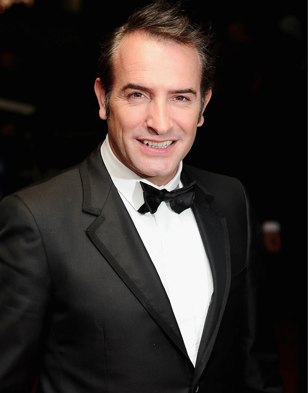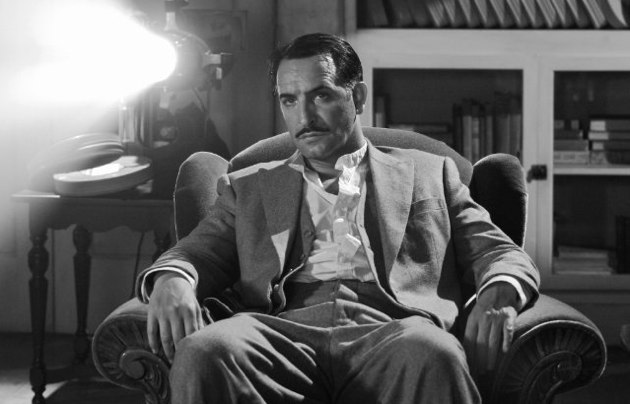Silent is Golden: A Chat With The Artist's Leading Man (and Oscar Frontrunner) Jean Dujardin
 A little over six months ago, before The Artist premiered at the Cannes Film Festival, it might have been unthinkable to foresee what has since evolved into a very real possibility: Jean Dujardin, a bona fide movie star in his native France but relative unknown in the United States, is as likely as any contender to date to win an Academy Award for Best Actor. Which would be surprising enough without The Artist being a black-and-white French import -- a silent black-and-white French import.
A little over six months ago, before The Artist premiered at the Cannes Film Festival, it might have been unthinkable to foresee what has since evolved into a very real possibility: Jean Dujardin, a bona fide movie star in his native France but relative unknown in the United States, is as likely as any contender to date to win an Academy Award for Best Actor. Which would be surprising enough without The Artist being a black-and-white French import -- a silent black-and-white French import.
But there you have it: Writer-director Michel Hazanavicius's breezy dramedy about a silent-era Hollywood legend cast away by the advent of talkies has become pretty much the story of the year's awards derby, with Dujardin, who won the Best Actor prize at Cannes, running neck-and-neck for the same prize at the upcoming Academy Awards. How did they do it? It's a long story -- one we'll be exploring off and on here at Movieline in the week to come as The Artist finally opens theatrically Stateside. But let it suffice to say that Dujardin, whose previous OSS 117 spy send-ups with Hazanavicius have enjoyed great success in their homeland, embodies protagonist George Valentin's exile with wry, romantic class for which there really are no words.
Nevertheless, Movieline caught up with Dujardin, who spoke through a translator about the Artist whirlwind, the science of silence, his brilliant canine co-star, and finally getting to know Hollywood.
You've been on Artist duty since Cannes. Is there anything I can ask you about this film that you haven't already been asked?
Oh. Ahhh... [Long pause] They don't ask often if I have fun. They ask me to explain what is unexplainable. It's a mysterious process, acting. It's more instinctive, and they always ask questions that we never ask ourselves as actors. Because with my characters, I always have fun. People talk about work and pressure, but rarely about pleasure.
So how fun was this compared to making a sound film, especially your previous collaborations with Michel?
It's a leap into the void! Your hands are tied behind your back, no lines. How do you make this character exist? I said to Michel, "What kind of silent movie would you like? If you want pantomime or Keaton or Chaplin, it's impossible." He said to me, "No, there are other kinds of silent movies -- Murnau's Sunrise, or King Vidor." And I understood what Michel wanted: He wanted a love story between Peppy Miller and George Valentin. It was much more instinctive than other movies, less thought-out. You put your intellect inside. There's more body language that you create -- reflex even, sometimes. And your body starts to tell the story, and that was very new, and I felt at home, strangely enough, because he often composes his characters with his body. It's very expressive. I think Michel knew it maybe even before I did, because it was written for us -- both roles. He gave us this incredible range to play.
When you say it was written for you, at what point did you enter the development process -- if at all -- to help influence how this character was shaped?
We just inspired Michel. He even says it: We're like a projection, a fantasy of who he would like to be -- feminine and masculine versions of who Michel would like to be. So he dressed us like dolls, he created lives for us, and it was up to us to offer him our take on it during the preparation and the research period. But you can only nourish your subconscious with photo exhibits, the films that you watch. And then you hope that it comes out on set.
How did dance and choreography help enhance the overall physicality of your character?
Well, there are little dance steps throughout the movie that I maybe archived from Gene Kelly, or that I might have seen even as a child years ago. So it was very familiar to me; I can still Gene Kelly's thighs when he taps like that. That was very instinctive. I didn't really prepare those. Maybe dance helped us because we did prepare for a long time -- five months before shooting. That probably helped -- moving differently.
I guess I'm asking if you felt like you were more in touch with your body in this role -- the way you express through movement.
It helped me be more confident with my body. There's a fear; you don't want to be a pantomime. You don't want to be overacting. You find the balance of what you want to say to people in a silent film, and also the satisfaction. You need to have that as an actor when you act.
And of course this is new for all of you. How did you or even Michel know -- if at all -- if or when you were overacting?
Michel's there to fine-tune things, but it's cinema. I can do five or six takes very differently, and he can take what he wants. That's what I offer him, and that's what he expects from me. I'm like raw material that he can mold. And it's also like in life: You're in a meal, and you think you're going to say something stupid, so you hold back. Some people don't know, and they don't hold back -- they don't censor themselves. It's instinct. You also have to be a spectator to what you're doing yourself when you're acting.
The first time you saw the film, what was your reaction?
It was multiplied by... It was surreal. I saw it at Cannes, on the biggest screen in Europe, with all these people who were laughing and clapping -- a standing ovation for 15 minutes. I saw it in the most incredible conditions you can imagine. But I found the balance -- the choice of scenes, and the way Michel cut them together, and the music, the daring, the audacity. Taking the music out in the end? In the second-to-last scene there's a silence -- a long silence. That's when I saw the boldness and the courage of the project -- when everything came together.
I have to ask you about Uggie--
Oui, oui!
--which is the one of the more evocative animal performances I've ever seen. How do you play opposite a dog who can steal a scene at any time?
Because I had a relationship with the dog trainer; I had met with the dog trainer two or three weeks before we started shooting. Uggie can do so many things. They have such an incredible relationship. He can skateboard, he can do anything. But he taught him specific things for this movie, like the paw over his head. I learned how to give him sausages or treats and get him used to my voice, my smell. But once he's eaten, the dog doesn't want to do anything anymore. So you have to wait a little bit and start over again. And we improvised, actually, because there are moments where I can't talk to him. In the scene where I put him on the table and he's watching the wife, I didn't know what he was going to do. I followed him out of the corner of my eye; he put his paw here, so I followed him. It's happy accidents of improvisation -- these things we would offer up to Michel, and Michel would take them or not.
How did you get to know the Americans in the cast?
With Penelope, we only had two or three days together. It was quite rapid. I think she was in her character, and I was in my character. I was very enthusiastic and up for this crazy joker; she was very meticulous. She was cutting her strawberries with a knife and fork. Her haircut, her dress helped her get into this frozen, cold character, and she has this intensity. When she says, "Speak to me!", you don't hear it. But I heard it! It was terrifying -- with her eyes full of tears. It was hard to even keep looking at her. She has a force; John Goodman as well. When he fires Bérénice, it comes from the center of the Earth. And next to that, when he smiles, he has a baby face; you can see the child who comes out.
But I shot the most with James Cromwell. He's charming and elegant and very protective. He spoke very slowly so I could understand. He was attentive to the whole crew. He was really specific in his questions; he had a very European sensibility in his acting style. I love James very much.
How much did being a Frenchman in Hollywood impact that kind of outsider feeling George experiences when the silent era ends?
I never put the two together. When I'm acting, I try to make myself completely available -- I listen to the director, and the rest I can't think about. We didn't have time! We had 35 days to make this movie -- 16 hour days. You just have to go for it.
I guess that really isn't much time to think about it.
No. And I do that well. [Laughs]
Follow S.T. VanAirsdale on Twitter.
Follow Movieline on Twitter.
[Top photo: Getty Images]

